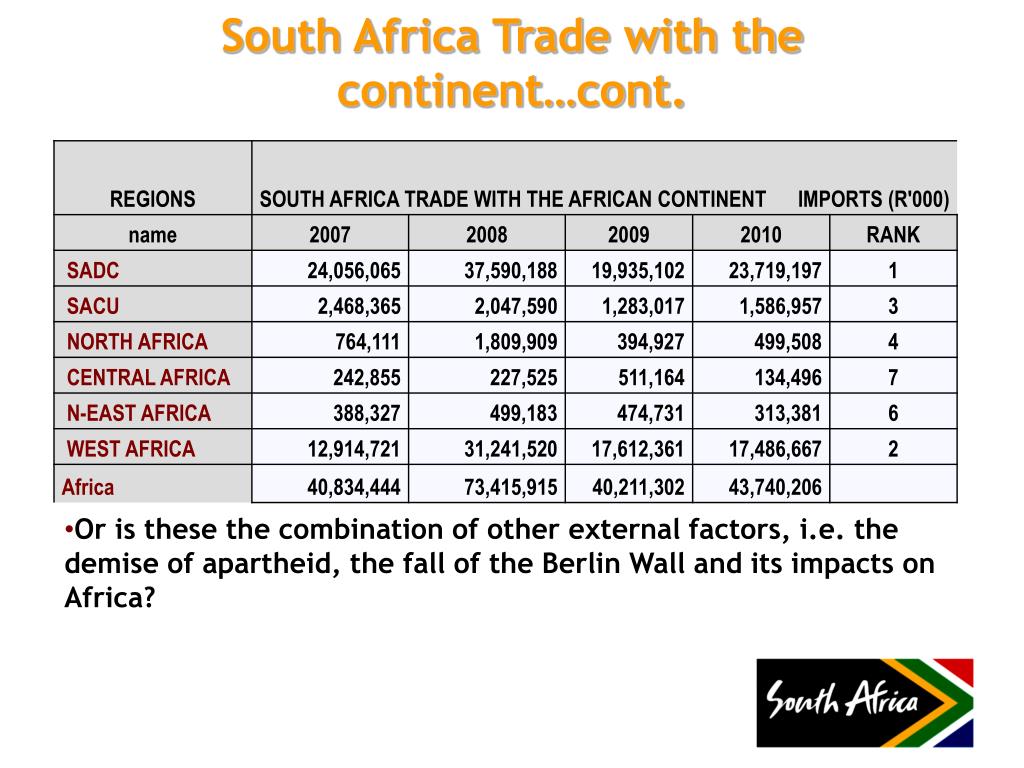South Africa, a nation with a vibrant economy and strategic location, has played a pivotal role in regional and international trade through its active involvement in numerous trade agreements. These pacts have played a fundamental role in shaping the country’s economic growth, competitiveness, and its overall position in the global marketplace. By forging partnerships with both neighboring countries and distant markets, South Africa has secured preferential access to diverse products, fostered cross-border investments, and established itself as a reliable partner in the global trade ecosystem.

Image: www.slideserve.com
In this article, we will delve into the complexities of South Africa’s trade agreements, exploring their historical roots, the key benefits they offer, and the potential challenges they present. We will also analyze the country’s strategic approach to trade negotiations and its commitment to promoting sustainable economic growth and development through mutually beneficial partnerships.
Historical Context
South Africa’s engagement in trade agreements dates back to its colonial history. During the apartheid era, the country was excluded from most international trade organizations due to its racist policies. After apartheid ended in 1994, South Africa set out to reintegrate itself into the global economy and rebuild its trade ties. The first major trade agreement that the country signed after becoming a democracy was the Southern African Development Community (SADC) Trade Protocol in 1996. This agreement established a free trade area among SADC member states, facilitating the free flow of goods and services within the region.
In the years since, South Africa has signed numerous other trade agreements, both bilaterally with individual countries and regionally with economic blocs. These agreements have provided South African businesses with preferential access to markets in Africa, Europe, Asia, and the Americas, and have helped to increase the country’s exports and diversify its economy.
Benefits of Trade Agreements
Trade agreements offer several key benefits to South Africa and its trading partners. These benefits include:
-
Increased market access: Trade agreements provide South African businesses with preferential access to foreign markets, allowing them to export their products more easily and at lower costs. This can lead to increased sales and higher profits for South African companies.
-
Reduced trade barriers: Trade agreements often reduce or eliminate tariffs and other trade barriers, making it easier and cheaper for goods to flow between countries. This can lead to lower prices for consumers and businesses, and can also help to boost economic growth.
-
Increased foreign investment: Trade agreements can make South Africa more attractive to foreign investors by providing them with greater certainty and stability. This can lead to increased investment in the South African economy, which can create jobs and boost economic growth.
-
Dispute resolution mechanisms: Most trade agreements include dispute resolution mechanisms that provide a way to resolve trade disputes between countries. This can help to prevent trade disputes from escalating into more serious conflicts.
Challenges of Trade Agreements
While trade agreements can provide many benefits, they also come with some challenges. These challenges include:
-
Job losses: Some critics argue that trade agreements can lead to job losses in certain industries, as companies relocate their production to countries with lower labor costs. However, research has shown that, in the long run, trade agreements tend to create more jobs than they destroy.
-
Environmental concerns: Some trade agreements have been criticized for not adequately addressing environmental concerns. These critics argue that trade agreements can lead to increased pollution and damage to the environment.
-
Loss of sovereignty: Some opponents of trade agreements argue that they can lead to countries losing their sovereignty, as they have to comply with the terms of the agreement. However, most trade agreements include provisions that protect the sovereignty of the countries involved.

Image: mrzine.monthlyreview.org
Conclusion
Trade agreements are an important tool for South Africa to promote economic growth, create jobs, and attract foreign investment. However, it is important to weigh the benefits of trade agreements against the potential challenges they present. By carefully considering the costs and benefits, South Africa can use trade agreements to achieve its economic goals without sacrificing its environmental values or its sovereignty.
South Africa And Trade Agreements
Call to Action
We encourage you to learn more about South Africa’s trade agreements and their impact on the country’s economy. You can find more information on the website of the Department of Trade, Industry and Competition (DTIC).






